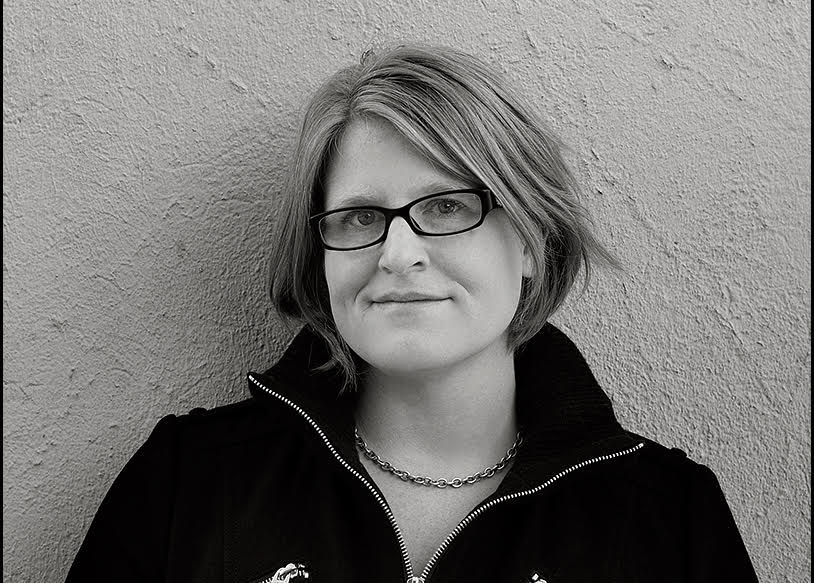Jenny Olivia Johnson has a … different artistic process than most. The musicologist and composer, who will join The UCLA Herb Alpert School of Music in Fall 2023 as associate professor of musicology, has always been known for mixing seemingly incompatible elements in her work.
By way of illustration, consider Johnson’s opera “The After Time,” which she began composing over twenty years ago. The opera tracks a traumatic event—a college student falls to her death under mysterious circumstances—from the vantage point of two people searching for answers in the aftermath. The opera had seventeen sequences, but Johnson found herself frustrated with having to order them. It felt forced and untrue to the sporadic and sometimes ludic nature of memory.
So what did Johnson do?
“I’m turning the opera into a video game,” said Johnson. “It was a way to create an immersive experience, but one that gives the listener some sense of agency. But it’s not a piece of music that coheres into any particular narrative. The narrative has to be created and recreated by the listener.”
To accomplish this, Johnson has had to learn how to design video games. But this is not her first foray into the unknown. After training at the Manhattan School of Music in composition, she realized that her curiosity about cross-sensory experiences with music would need more sustained intellectual engagement.
She enrolled in NYU’s musicology program. Her research into trauma and the ways in which trauma induced synesthetic responses in subjects necessitated an interdisciplinary approach. Soon, Johnson was knocking on doors in the philosophy and neuroscience departments.
“I’m very much a hybrid scholar-musician-composer,” said Johnson. “I’m not secretly a composer or dallying in musicology. I think my scholarship and my music go hand-in-hand.”

Interdisciplinary approaches can sometimes be difficult to pursue in the academy, whether in music or musicology. Johnson began composing in high school while attending the Idyllwild Arts Academy. Her music fused elements of experimental jazz and rock. It was an approach that Johnson remembers being “drilled out of her” when she studied formal composition. And in a scholarly world dominated by specialists, cross-disciplinary work can be regarded as superficial.
Not that Johnson suffers from this problem.
“Johnson has become increasingly prominent in trauma studies, one of musicology’s growing subfields,” said Ray Knapp, distinguished professor and chair of the musicology department at UCLA. “What is really remarkable is how each strand of her work—composing, theory, trauma studies—intertwines with the others. Her work in musicology brings in musical aesthetics, psychology, and institutional practices, centering in particular on the shadow that abuse casts over the music its victims produce.”
Knapp noted that Johnson was an award-winning teacher who had already made deep connections with many of the School of Music’s students. For Johnson, part of the attraction of UCLA is the chance to work with a diverse student body, one that appreciates creative, out-of-the-box approaches to education. In 2021-22, she taught as a visiting professor at UCLA, and was struck by the diversity of backgrounds, experiences and styles of the students in her courses.
“The students were all excited to be so expressive,” said Johnson. “It was stimulating to have students from all over campus, from all kinds of majors, who were interested in how sound connected to their work.”
Earlier this year, Johnson returned to the School of Music to deliver a talk connecting her compositional practice to deeper cultural concerns. “The conversation after her talk was one of the richest I’ve ever witnessed,” Knapp recalled. “One of our faculty members noted her ability to create a ‘community of thinkers’ around difficult musicology topics. She will be a wonderful mentor for our students.”
She has already proven herself a mentor. Ashley Dao, third-year musicology student, recalled the pivotal role that Johnson’s seminar had in developing her research interests.
“I took Jenny Johnson’s “Music, Trauma, and Empathy” graduate seminar in Winter 2022, and her unique, collaborative approach cultivates rich intellectual conversation while building a safe and resilient community. I was initially intimidated to enter the discourse because of an immense pressure to delineate and delimit an experience as complex as trauma, but Jenny empowered me to embrace aporia, irresolvable ironies, and unknowing in my research.” Dao will be continuing her research into graduate school under the auspices of a Beinecke Fellowship.
Johnson plans to continue her scholarly research and composition as she enters her new position on the faculty. She is currently preparing a book manuscript on trauma, memory and soundscape [need to verify this!]. And yes, she is still working on adapting her opera The After Time into a video game.
“I was kind of always fighting to write my own music,” said Johnson, recalling her first experience working on music composition. “And I think I just never gave up that fight.”


